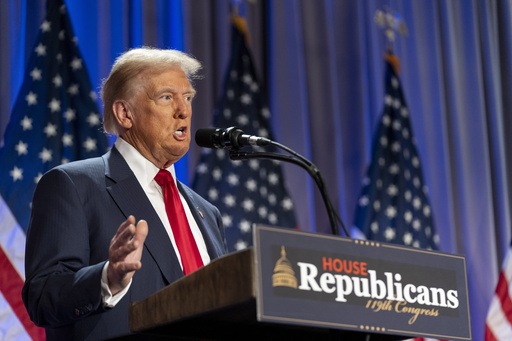
Donald Trump’s vision for the American education system focuses on a primary objective: to eliminate what he regards as “wokeness” and “leftist indoctrination” from schools across the nation.
He aims to keep transgender athletes from participating in girls’ sports, ban discussions about gender identity and structural racism from classrooms, and eliminate offices dedicated to diversity and inclusion.
Having won the presidential election, Trump insists that educational institutions now represent a political battleground that must be reclaimed, and he plans to utilize federal funding as a tool to implement his educational agenda nationwide.
His education initiative promises to withdraw federal funding from schools that resist his policies on several fronts.
On his first day in office, Trump has made it clear he will cut financial support for “any school promoting critical race theory, transgender issues, or any inappropriate content concerning race or politics directed at our children.” He has also stated he would not provide funding to schools that impose vaccine mandates or mask requirements.
While he claims this will be enacted through executive action, even some allies express skepticism regarding his ability to enact such widespread changes quickly.
Critics argue that Trump’s portrayal of America’s educational landscape is distorted and politically motivated, contending that the so-called liberal indoctrination he decries does not actually exist.
They warn that his proposals could undermine public education and harm the very students who rely on the services provided by schools.
“This is fear-driven, misleading information, and I would categorize it as propaganda,” stated Wil Del Pilar from the Education Trust, an advocacy organization. “There is no proof that students are being instructed to question their sexuality in schools, nor is there any evidence of an educational system filled with extremists.”
Trump’s platform proposes “significant funding incentives” for states and educational institutions that eliminate teacher tenure, adopt universal school choice initiatives, and allow parents to select school leaders.
One of his more ambitious promises involves entirely abolishing the U.S. Department of Education, a longstanding aim of conservatives, claiming it has been overtaken by radicals.
Currently, approximately 14% of public K-12 schools’ funding comes from the federal government, primarily aimed at low-income students and special education, with the bulk of funding provided by local taxes and state budgets.
In contrast, colleges are more reliant on federal support, particularly through grants and loans that help students afford tuition.
Trump’s capability to leverage school finances resides in his role in enforcing civil rights; the Education Department has the authority to withdraw federal funds from schools and universities that fail to adhere to civil rights regulations.
Although he cannot swiftly eliminate funding from numerous school districts, targeting a select few could prompt many others to comply, according to Bob Eitel of the Defense of Freedom Institute, who served in Trump’s first term.
Trump has also hinted at legislative actions to facilitate some of his educational promises, which may include imposing fines on universities concerning their diversity initiatives.
To push colleges to dismantle these programs, which he deems discriminatory, he proposes imposing fines equal to the total amount of their endowments.
Furthermore, he plans to establish a new free online university named the American Academy, proposing to fund it by “taxing, fining, and suing excessively large university endowments.”
During his previous term, Trump occasionally threatened to withdraw funding from schools that did not comply with his directives, such as those reluctant to reopen amid the pandemic or universities he accused of stifling free speech.
However, most of these threats didn’t materialize, even though he successfully lobbied Congress to introduce a tax on wealthy university endowments and made significant changes to campus sexual assault regulations.
Universities are hopeful that their interactions with the administration will be less adversarial than Trump’s rhetoric suggests.
“Education has often been an easy target during campaigning,” noted Peter McDonough, general counsel for the American Council on Education. “A cooperative relationship between higher education and the administration would be more beneficial to the nation than attacking the educational framework.”
Trump’s threats of stringent penalties seem at odds with another component of his educational vision — his intent to withdraw federal authority from local schools.
In his goal to dissolve the Education Department, he claims he will return “all educational responsibilities back to the states.” He has made promises to ensure that schools operate without political interference coming from Washington, D.C.
However, instead of allowing states and schools to form their own policies on divisive subjects, Trump seeks to impose comprehensive bans that fit his agenda.
By not maintaining a neutral position and permitting states to decide, Trump risks not fulfilling his campaign promises, according to Max Eden from a conservative think tank.
For instance, he plans to rescind guidance from the Biden administration that extended Title IX protections to LGBTQ+ students and aims to enact a nationwide prohibition on transgender women participating in female sports.
Trump is also determined to have a hand in educational curricula, advocating for what he calls “patriotic” education.
He has vowed to reinstate the 1776 Commission, initially established in 2021, to promote such educational values, asserting that progressivism presents a challenge to American ideals, alongside fascism.
Additionally, Trump intends to create a new body responsible for certifying educators who endorse patriotic principles.
While many of Trump’s major educational aspirations cannot be realized immediately and would necessitate new congressional measures or lengthy federal processes, he is expected to act swiftly to negate executive orders established by Biden, including one focused on racial equity within the federal government.
He is also anticipated to promptly reverse or amend Biden’s Title IX regulations, though executing those changes may involve a more prolonged procedure.
Specific details surrounding his plans for student loans remain unclear; however, he has characterized Biden’s loan forgiveness proposals as both unlawful and unjust.
Many of Biden’s key educational initiatives are currently stalled due to ongoing legal challenges, including widespread loan cancellations and more favorable repayment programs, which could be nullified or modified once Trump takes office.
